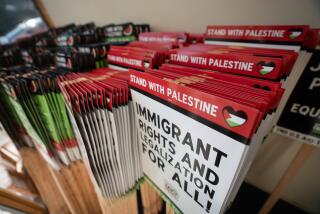PERSPECTIVE ON THE GULF CRISIS : A Pause to Look Over the Brink ... : In the field, all is confident readiness, but calling a summit suggests that a military ‘quick fix’ is not the U.S. intent.
- Share via
DHAHRAN, Saudi Arabia — The United States will soon be able to decide whether to initiate combat with Iraqi forces in the Persian Gulf. That judgment by U.S. military commanders increases the urgency of deciding the wisdom of such a course. It also demands that President Bush explain directly to the American people the stakes in the crisis, the options, the costs, and what he plans to do.
Although U.S. forces have been moving toward the gulf for only a few weeks, American air and sea commanders in Saudi Arabia and Bahrain are ready to take on Iraq. They are confident of the outcome and are inclined to get it over with. Ground force commanders are more cautious about offensive operations at this stage of the buildup, but they are already sure of their ability to contain an Iraqi attack.
The pace of the U.S. buildup has been stunning. Military aircraft litter the region’s airfields, leading one officer to quip that putting any more on the ground would cause Saudi Arabia to sink. Last Saturday, the flagship Blue Ridge steamed into the harbor at Manama, Bahrain, and rigged up the complex electronics needed to manage a modern war. Airborne troops are deployed forward in the desert, masses of supplies are rolling off gangways and aircraft ramps, and Marine amphibious units will arrive this week.
U.S. military deployments are thus lending credence to the Bush Administration’s strategy. Iraq’s Saddam Hussein must weigh the risks to his position at home as well as in Kuwait. And any nation that is halfhearted about supporting the economic embargo knows now that there is a riskier alternative: open combat.
Regional states, usually inclined to temporize, are facing up to the possibility of war. Bahrain’s leaders do not believe it can be avoided without accepting Iraq’s gains. Saudi Arabia is reluctantly willing to envision conflict if sanctions come to be seen as having failed, and Egypt believes that that time is at most a few months off. No one in the region believes that Saddam Hussein will give up easily.
These assessments do not account for the imponderables of war, however. U.S. forces may be certain to prevail at sea and in the air, but success on the ground would depend on a host of assumptions. These include the ability of air power to keep Iraq from reinforcing its tank armies, which vastly outnumber opposing ground forces and will do so even after the U.S. buildup is completed. While U.S. forces would control the air and any night fighting, Iraq has the advantages of mass, proximity, combat experience and adaptation to climate.
Morale is high among U.S. soldiers, but it will be tested by the harsh conditions and, perhaps, by uncertainty about what the United States would be fighting for. In random conversations, these young Americans express awareness that they are not being asked to defend democracy, and for many of them, protecting the supply and price of oil is not a compelling argument to start a war. A spirit of professionalism counts now, but it may not be enough later on, especially if there were no quick victory but rather a punishing battle of attrition.
Despite the impressive buildup of American military power, therefore, the visitor to this forbidding part of the world is encouraged to explore other ways to get Iraq to leave Kuwait--the indispensable objective. One dimension bears particular consideration: the unprecedented coalition that Bush has put together to support that limited objective. A U.S.-initiated war would splinter the coalition, and with it the President’s attempt to exercise U.S. leadership through multilateral action.
The alternative remains economic sanctions, a policy of waiting out Saddam Hussein. But sanctions impose their own difficult challenge: patience. That is not an American strength, as reflected in fears that U.S. troops cannot be kept in the Arabian desert for very long simply as a deterrent force.
President Bush may already have decided to put aside the alluring, though perhaps elusive, vision of a military “quick fix.” This is suggested by his plan to meet with Mikhail Gorbachev in Helsinki next Sunday. The fact of the meeting would make it harder for the United States to start a war because, having conferred with Bush, the Soviet president would appear to be in collusion with subsequent U.S. actions--an untenable position. The meeting announcement itself has already taken the edge off the U.S. tactic of trying to scare Iraq into thinking that war is imminent.
Bush is likely to use the summit to draw the diplomatic noose more tightly around Saddam Hussein’s neck, to reassure Gorbachev that the United States has no long-term ambitions in the Persian Gulf that threaten Soviet interests, to stress the possibilities of U.S.-Soviet cooperation beyond Europe, and to broaden the media’s focus. He could even invite Gorbachev to send Soviet forces to join the gulf blockade.
The conduct of the summit can thus be the tip-off to Bush’s plans. But the American people should not have to look for such signals of presidential intent on an issue of war and peace. It is the President’s duty to present his goals and methods clearly to the nation. Otherwise, he could find himself with a military buildup that cannot be sustained for long at high levels, domestic frustration with the lack of resolution after so much activity, and global economic crisis based, in part, on confusion about U.S. intentions.
More to Read
Sign up for Essential California
The most important California stories and recommendations in your inbox every morning.
You may occasionally receive promotional content from the Los Angeles Times.













